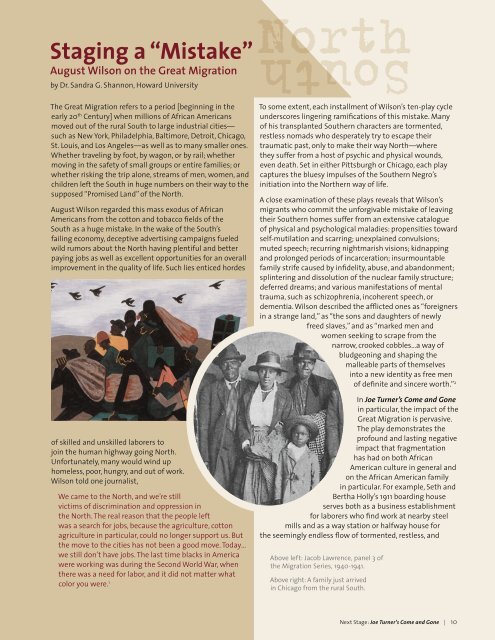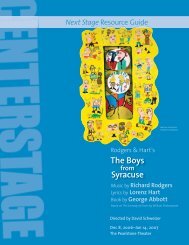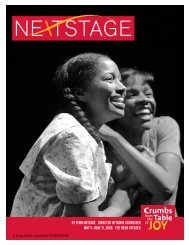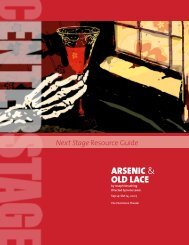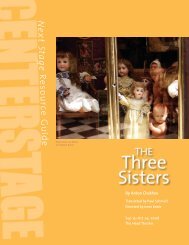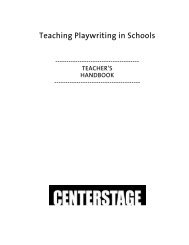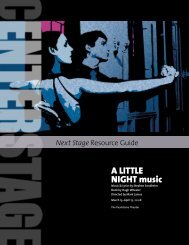Joe turner's Come and Gone - Center Stage
Joe turner's Come and Gone - Center Stage
Joe turner's Come and Gone - Center Stage
Create successful ePaper yourself
Turn your PDF publications into a flip-book with our unique Google optimized e-Paper software.
Staging a “Mistake”<br />
August Wilson on the Great Migration<br />
by Dr. S<strong>and</strong>ra G. Shannon, Howard University<br />
The Great Migration refers to a period [beginning in the<br />
early 20 th Century] when millions of African Americans<br />
moved out of the rural South to large industrial cities—<br />
such as New York, Philadelphia, Baltimore, Detroit, Chicago,<br />
St. Louis, <strong>and</strong> Los Angeles—as well as to many smaller ones.<br />
Whether traveling by foot, by wagon, or by rail; whether<br />
moving in the safety of small groups or entire families; or<br />
whether risking the trip alone, streams of men, women, <strong>and</strong><br />
children left the South in huge numbers on their way to the<br />
supposed “Promised L<strong>and</strong>” of the North.<br />
August Wilson regarded this mass exodus of African<br />
Americans from the cotton <strong>and</strong> tobacco fields of the<br />
South as a huge mistake. In the wake of the South’s<br />
failing economy, deceptive advertising campaigns fueled<br />
wild rumors about the North having plentiful <strong>and</strong> better<br />
paying jobs as well as excellent opportunities for an overall<br />
improvement in the quality of life. Such lies enticed hordes<br />
of skilled <strong>and</strong> unskilled laborers to<br />
join the human highway going North.<br />
Unfortunately, many would wind up<br />
homeless, poor, hungry, <strong>and</strong> out of work.<br />
Wilson told one journalist,<br />
We came to the North, <strong>and</strong> we’re still<br />
victims of discrimination <strong>and</strong> oppression in<br />
the North. The real reason that the people left<br />
was a search for jobs, because the agriculture, cotton<br />
agriculture in particular, could no longer support us. But<br />
the move to the cities has not been a good move. Today…<br />
we still don’t have jobs. The last time blacks in America<br />
were working was during the Second World War, when<br />
there was a need for labor, <strong>and</strong> it did not matter what<br />
color you were. 1<br />
To some extent, each installment of Wilson’s ten-play cycle<br />
underscores lingering ramifications of this mistake. Many<br />
of his transplanted Southern characters are tormented,<br />
restless nomads who desperately try to escape their<br />
traumatic past, only to make their way North—where<br />
they suffer from a host of psychic <strong>and</strong> physical wounds,<br />
even death. Set in either Pittsburgh or Chicago, each play<br />
captures the bluesy impulses of the Southern Negro’s<br />
initiation into the Northern way of life.<br />
NorthSouth<br />
A close examination of these plays reveals that Wilson’s<br />
migrants who commit the unforgivable mistake of leaving<br />
their Southern homes suffer from an extensive catalogue<br />
of physical <strong>and</strong> psychological maladies: propensities toward<br />
self-mutilation <strong>and</strong> scarring; unexplained convulsions;<br />
muted speech; recurring nightmarish visions; kidnapping<br />
<strong>and</strong> prolonged periods of incarceration; insurmountable<br />
family strife caused by infidelity, abuse, <strong>and</strong> ab<strong>and</strong>onment;<br />
splintering <strong>and</strong> dissolution of the nuclear family structure;<br />
deferred dreams; <strong>and</strong> various manifestations of mental<br />
trauma, such as schizophrenia, incoherent speech, or<br />
dementia. Wilson described the afflicted ones as “foreigners<br />
in a strange l<strong>and</strong>,” as “the sons <strong>and</strong> daughters of newly<br />
freed slaves,” <strong>and</strong> as “marked men <strong>and</strong><br />
women seeking to scrape from the<br />
narrow, crooked cobbles…a way of<br />
bludgeoning <strong>and</strong> shaping the<br />
malleable parts of themselves<br />
into a new identity as free men<br />
of definite <strong>and</strong> sincere worth.” 2<br />
In <strong>Joe</strong> Turner’s <strong>Come</strong> <strong>and</strong> <strong>Gone</strong><br />
in particular, the impact of the<br />
Great Migration is pervasive.<br />
The play demonstrates the<br />
profound <strong>and</strong> lasting negative<br />
impact that fragmentation<br />
has had on both African<br />
American culture in general <strong>and</strong><br />
on the African American family<br />
in particular. For example, Seth <strong>and</strong><br />
Bertha Holly’s 1911 boarding house<br />
serves both as a business establishment<br />
for laborers who find work at nearby steel<br />
mills <strong>and</strong> as a way station or halfway house for<br />
the seemingly endless flow of tormented, restless, <strong>and</strong><br />
Above left: Jacob Lawrence, panel 3 of<br />
the Migration Series, 1940-1941.<br />
Above right: A family just arrived<br />
in Chicago from the rural South.<br />
Next <strong>Stage</strong>: <strong>Joe</strong> Turner’s <strong>Come</strong> <strong>and</strong> <strong>Gone</strong> | 10


